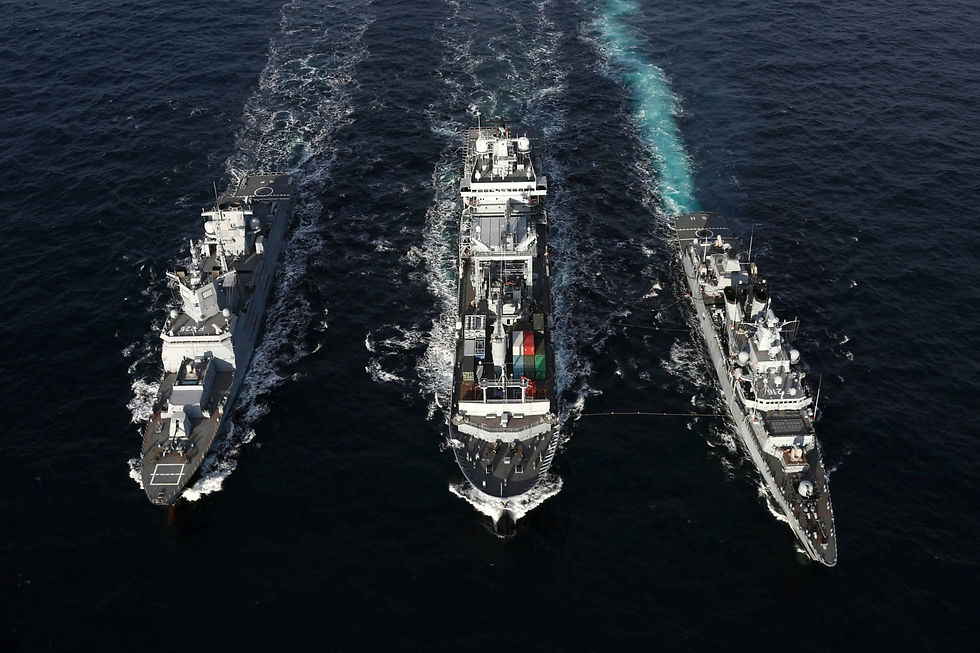The South China Sea Dispute: Can International Law Settle It?
- jessevisionfactory
- Aug 18, 2025
- 4 min read
The South China Sea can be called a huge global crossroads, and that name is fitting because about a third of the world's trade passes through it. It is one of the richest fishing grounds in the world, but it is also rich in resources such as oil and gas.
This is precisely why it has become one of the most disputed areas in the world. There is a problem because several countries, namely China, Vietnam, Philippines, Malaysia, Brunei and Taiwan have the same claim to the area.
The “nine-dash line” is an imaginary line that covers almost 90% of the sea, and this percentage includes parts already claimed by other nations. Due to high tensions, military and fishing boats collide, the question arises: can international law actually solve this mess?

What the Law Actually Says
At the heart of this issue is a legal framework called UNCLOS - the United Nations Convention on the Law of the Sea. Try to think of it as a global handbook on which part of the ocean belongs to whom. It states that each coastal country has an exclusive economic zone (EEZ) that extends up to 200 nautical miles from its coast. In that zone, they have the right to fish, extract oil and use natural resources.
The Permanent Court of Arbitration (PCA) ruled in favor of the Philippines in 2016, then things got serious because the court ruled that China's nine-dash line had no legal basis under UNCLOS.
Do you consider it a good decision? Well, not really. China continued to build artificial islands and set up military bases in the disputed waters, thereby proving that it had rejected the ruling. This shows that even with international law, enforcement remains a huge problem.
Why Is It So Difficult to Enforce International Law?
International law sounds strong and serious, but it often lacks the elements that would fairly adjudicate all parties. Unlike local laws that come with police, courts, and jails, international courts can’t really force anyone to obey.
Yes, the 2016 ruling is binding. But without a global enforcement agency - or the political will of powerful countries - nothing really stops China from ignoring it.
And smaller nations like the Philippines or Vietnam? They do not have sufficient military strength or economic leverage to be able to strike back.
Therefore, although clear legal rulings have been made, the reality at sea is still confusing. China's navy and coast guard ships continue to patrol disputed areas, and other countries walk the thin line between resistance and diplomacy.

Why the Law Still Matters
The question arises, how does international law not affect this situation? Not at all.
Even if it can’t force behavior, it can help shape it. That 2016 ruling, for example, gave other Southeast Asian countries a legal reference point.
It also helped rally global opinion. Countries like the United States, Australia, Japan, and EU members have publicly supported UNCLOS and the PCA ruling. International law, among other things, gives countries a common language to negotiate.
It may not end a conflict overnight, but it keeps the problem in the spotlight and prevents it from sliding into outright lawlessness. It is also important that as many countries as possible abide by the rules, because that makes it harder for any country, including China, to reshape them.
Power, Politics, and the Path Forward
Ultimately, the South China Sea dispute is not just about maps and borders; it is about power, reputation, pride and politics. International law, particularly through UNCLOS, gives us a perfectly decent starting point. What’s needed is a mix of legal pressure, diplomatic effort, and regional cooperation. Still, dismissing international law would be a mistake. It’s the only thing keeping this conflict from turning into a free-for-all. And the more we support those legal frameworks, the stronger they become. So, while the law alone will not solve every problem in the South China Sea, it remains an important guide.
Final Thoughts
The South China Sea is not just some distant speck out there, it shows us how power, law, and collide in the modern world. If a global rulebook like UNCLOS cannot survive in one of the most closely watched maritime regions on Earth, what does that say about our skills and capabilities to solve future problems? That is why it is so important to be informed about the things happening around us, most of us shake our heads and think that is somewhere far away. Think about that fact for a moment. This is important not to anyone who believes in a rules-based international order. This problem shows us the potential and the limits of rights. It is not easy to get something to change, but legal principles must be included along with shared values and pressure from the global community, so that things do not become more alarming.
You can also read about:
Sources
The South China Sea Arbitration Through the Prism of Authoritarian International Law The Biggest Misconception About the Philippines’ South China Sea Case Against ChinaIndonesia parliament set to ratify sea boundary with Vietnam, lawmaker says
US commander says China has failed to coerce rival states in South China Sea




Comments